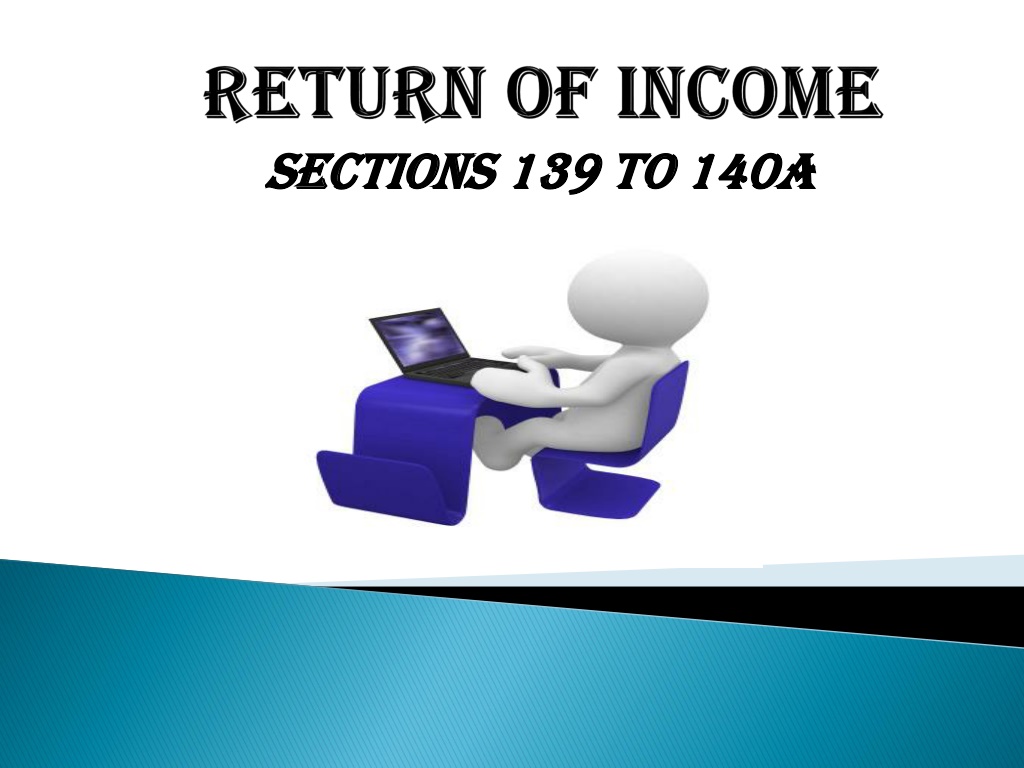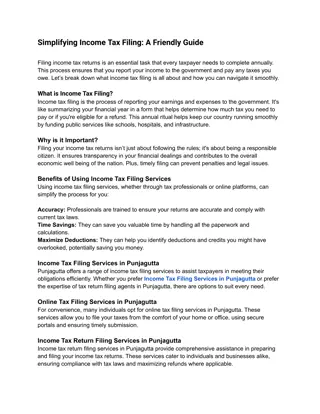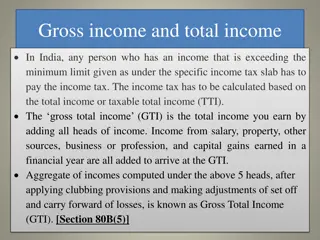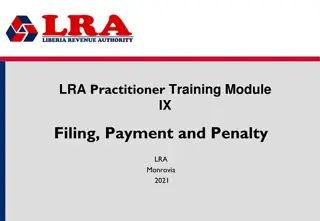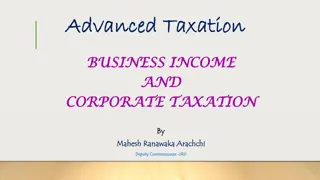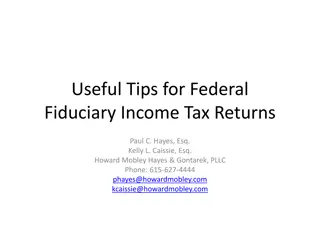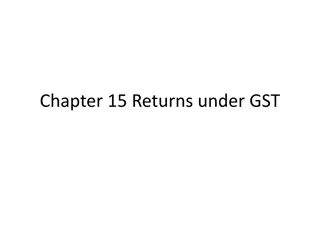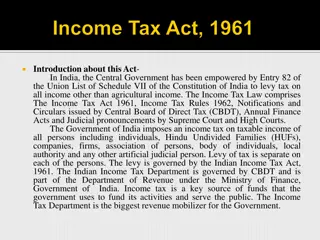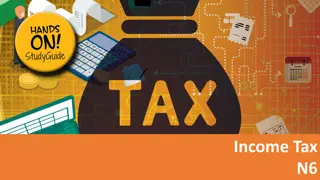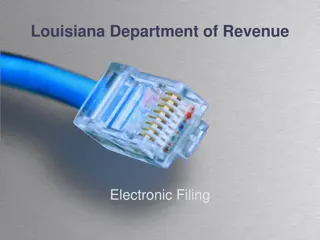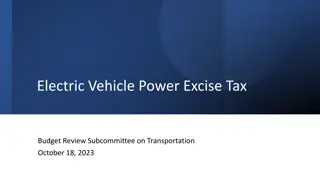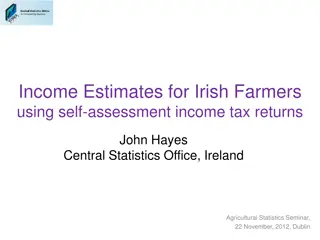Understanding the Importance of Filing Income Tax Returns
Filing income tax returns is crucial as it involves declaring total income and tax payable. Deadlines are specified based on the type of assessee, with penalties for late filing. The process allows for claiming refunds, showing financial worth for visas, and ensuring eligibility for tenders. Failing to file on time may lead to interest payments, loss carry-forward restrictions, and penalties from the Income Tax Department. E-Filing is the electronic method for submitting returns online.
Download Presentation

Please find below an Image/Link to download the presentation.
The content on the website is provided AS IS for your information and personal use only. It may not be sold, licensed, or shared on other websites without obtaining consent from the author. Download presentation by click this link. If you encounter any issues during the download, it is possible that the publisher has removed the file from their server.
E N D
Presentation Transcript
Sections 139 to 140A Sections 139 to 140A
Return of income is the format in which the assessee furnishes information as to his total income and tax payable. In short, a return of income is the declaration of income by the assessee in the prescribed format. The particulars of income earned under different heads, gross total income, deductions from gross total income, total income and tax payable by the assessee are required to be furnished in a return of income. The Act has prescribed due dates for filing return of income in case of different assessees. All companies and firms have to mandatorily file their return of income before the due date. Other persons have to file a return of income if their total income exceeds the basic exemption limit.
30 30th th Sept. of the assessment year Company Person (other than a company) whose accounts are required to be audited Working partner of a firm whose accounts are required to be audited Sept. of the assessment year 30 30th th Nov. of the assessment year Assessee who is required to furnish a report of chartered accountant Nov. of the assessment year 31 31st st July of the assessment year Any other assessee July of the assessment year
Belated return can be filed at any time: a) Before the end of the relevant assessment year OR b) Before the completion of the assessment WHICHEVER IS EARLIER
Standard income proof Loans sanctioned quickly and easily Claim refunds for taxes deducted or paid in excess of your tax liabilities Many foreign countries want to know the financial worth of the applicant before granting visa For professionals and business organisations, Income tax returns are must to become eligible to secure certain tenders.
If you dont file your return in time, you will have to pay interest on your tax dues when you file at a later date. If you have incurred losses, you can not carry forward the same to subsequent years if you do not file your return. You could become liable for a penalty or Prosecution by the Income Tax Department if you conceal or fail to disclose your income.
The process of electronically filing Income tax returns through the internet is known as E-Filing.
1. Prompt processing The acknowledgment of Income Tax Return (ITR) is quick. More importantly, refunds, if any, are processed faster than paper-filed returns. 2. Better accuracy E-filing software with built-in validations and electronic connectivity is seamless and minimizes errors considerably. Paper- filings can be prone to errors. Also, when any paper-based form is migrated to the electronic system, there is a possibility of human error in data entry. 3. Convenience No time and place constraint in filing returns online. E-filing facility is available 24/7 and you can file anytime, anywhere at your convenience.
4. Confidentiality Better security than paper filings since your data is not accessible to anyone either by design or by chance. With paper filings details of your income can fall in the wrong hands at your chartered accountant s office or in the Income Tax Department s office. 5. Accessibility to past data You can easily access past data while filing returns. Most e-filing applications store data in a secure manner and allow for easy access at the time of filing subsequent returns. 6. Proof of receipt You get prompt confirmation of filing, both at time of filing and subsequently, via email on your registered email id
7. Ease of use E-filing is friendly and the detailed instructions make it easy even for individuals not very conversant with the internet 8. Electronic banking Convenience of direct deposit for refund and direct debit for tax payments. You have the option to file now, pay later - decide what day to debit your bank account for tax payment, among other convenience features.
ITR-1 Also known as SAHAJ is applicable to an individual having salary or pension income or income from one house property (not a case of brought forward loss) or income from other sources (not being lottery winnings and income from race horses). ITR-2 It is applicable to an individual or a Hindu Undivided Family having income from any source other than "Profits and gains of business or profession".
ITR-2A It is applicable to an individual or HUF whose total income does not include income from business or profession, capital gains. Further, an individual or HUF having any asset (including financial interest in any entity) located outside India or having any signing authority in any account located outside India or having income from any source outside India cannot use this form for filing of return of income. ITR-3 It is applicable to an individual or HUF who is a partner in a firm and where income chargeable to tax under the head "Profits or gains of business or profession" does not include any income except the income by way of any interest, salary, bonus, commission or remuneration, by whatever name called, due to, or received by him from such firm.
ITR-4 It is applicable to an individual or a Hindu Undivided Family who is carrying on a proprietary business or profession. ITR-4S Also known as SUGAM is applicable to individuals or HUF or partnership firm (other than limited liability partnership firm) who have opted for the presumptive taxation scheme of section 44AD (Presumptive computation of profits for taxation for business) or 44AE (Business of plying, leasing or hiring trucks). ITR-5 This Form can be used by a person being a firm, LLP, AOP, BOI, artificial juridical person, co-operative society and local authority.
ITR-6 It is applicable to a company, other than a company claiming exemption under section 11 i.e. exemption claimed by charitable/religious trust. ITR-7 It is applicable to a persons including companies who are required to furnish return under section 139(4A) or section 139(4B) or section 139(4C) or section 139(4D) or section 139(4E) or section 139(4F) (i.e., trusts, political parties, institutions, colleges, investment fund, etc.). ITR-V It is the acknowledgement of filing the return of income.
(1) Any assessee filing ITR 1/2/2A (other than an individual of the age of 80 years or more at anytime during the previous year) having a refund claim in the return or having total income of more than Rs.5,00,000 is required to furnish the return of income electronically. (2) Every company shall furnish the return of income electronically. (3) A firm or an individual or HUF whose books of account are required to be audited under section 44AB shall furnish the return of income electronically. (4) Resident assessee having any assets located outside India or signing authority in any account located outside India or Income from any source outside India shall furnish the return of income electronically.
(5) Taxpayers claiming relief under section 90 (Double Tax Avoidance Agreement with other countries), 90A (Agreements between Specified Associations) or 91 (countries with which no agreements exists) shall furnish the return of income electronically. (6) A person who is required to file ITR - 5 shall file the same electronically.
PERSON CONDITIONS MODE OF FURNISHING RETURN INDIVIDUAL/ HUF Accounts are required to be audited u/s 44 AB Electronically with digital signature Accounts are not required to be audited u/s 44 AB but one or more of the conditions are satisfied- 1. Return is furnished in ITR-3 or ITR-4. 2. A resident and ordinarily resident assessee has assets located outside india; Or signing authority outside india or income from any source outside india. 3. Relief is claimed u/s 90; 90A or 91 Return can be submitted by using any one of the following electronic modes- A. Electronically under digital signature; or B. Transmitting the data in the return electronically under electronic verification code; or C. Transmitting the data in the return electronically and therefore submitting
PERSON CONDITIONS MODE OF FURNISHING RETURN the verification of the return in Form ITR-V INDIVIDUAL/ HUF 4. Total income assessable exceeds Rs. 500,000 or any refund is claimed in the return(this condition is not applicable to super senior citizen of 80 years or more who furnishes return in ITR-1 or ITR-2) Any other case Electronic mode given in case 2; or Paper format Electronically with digital signature COMPANY Any company
PERSON CONDITIONS MODE OF FURNISHING RETURN Person required to furnish return in ITR-7 Political Party Electronically with digital signature Any other case Return can be submitted by using any one of the following electronic modes- A. Electronically under digital signature; or B. Transmitting the data in the return electronically under electronic verification code; or C. Transmitting the data in the return electronically and therefore submitting the verification of the return in Form ITR-V
PERSON CONDITIONS MODE OF FURNISHING RETURN Firm, LLP or any person (not mentioned above) required to furnish return in ITR-5 accounts are required to be audited under section 44 AB Electronically with digital signature any other case Return can be submitted by using any one of the following electronic modes- A. Electronically under digital signature; or B. Transmitting the data in the return electronically under electronic verification code; or C. Transmitting the data in the return electronically and therefore submitting the verification of the return in Form ITR-V
Pre Pre- -requisite for registration in e requisite for registration in e- -Filing application Filing application A user must register at www.incometaxindiaefiling.gov.in Pre-requisites to register PAN (Permanent Account Number) TAN (Tax Deduction Account Number) Membership with ICAI - For Chartered Accountant Registration process Provide PAN / TAN, Password details, Personal details as per PAN / TAN, Contact details and Digital signature (if available and applicable) Submit request On success, Activation link is sent to user through e-mail and a mobile PIN to mobile number. Click on the activation link and provide Mobile PIN to activate e-Filing account. Once registered, LOGIN using User ID, Password ,Date of Birth/ Incorporation and Captcha code
WHAT IS PAN? Permanent Account Number (PAN) is a ten-digit alphanumeric identifier, issued by Income Tax Department. Each assessee (e.g. individual, firm, company etc.) is issued a unique PAN. All existing assessees or taxpayers or persons who are required to file a return of income, even on behalf of others, must have a PAN. Any person, who intends to enter into economic or financial transactions where quoting PAN is mandatory, must also have a PAN. it is compulsory to quote PAN on return of income
